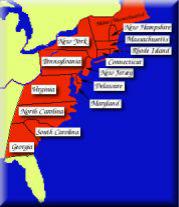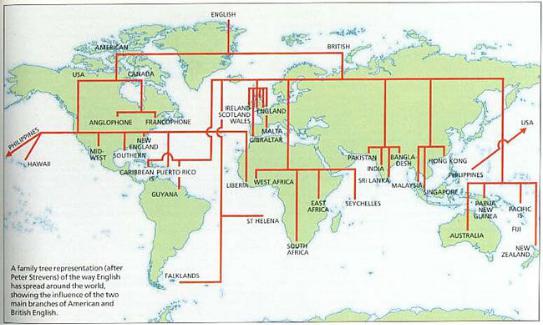
Uchebnik_lakhotyuk_mikhaylova
.pdf
French, the ordinary people spoke English, while Latin was used in the church.
Modern English evolved from the mingling of the three tongues. Today English vocabulary is approximately half Germanic (from the Saxons and Vikings) and half Romance (from French and Latin). There are however considerable borrowings from other languages.
 3.7 Read the text again and make notes under the headings below:
3.7 Read the text again and make notes under the headings below:
Date |
Historical event |
Its influence on the language |
The Normans in England
 3.8 Look at the words in the list. Then match the bold prefixes with their meanings.
3.8 Look at the words in the list. Then match the bold prefixes with their meanings.
e.g. co-exist - together
a. |
antisocial |
h. |
multinational |
b. |
autograph |
i. |
overworked |
c. |
ex-husband |
j. |
postgraduate |
d. |
biannual |
k. |
preconceived |
e. |
misspell |
l. |
rewind |
f. |
microscopic |
m. semi-final |
|
g. |
monosyllabic |
n. underpaid |
|
1. |
after |
7. |
half |
2. |
again or back |
8. |
many |
3. |
against |
9. |
not enough |
4. |
badly / wrongly |
10.of or by oneself |
|
5. |
before |
11.one |
|
6. |
former |
12.small |
|
32

13.too much |
14.twice |
 3.9 Add a prefix to the correct form of the word at the end of each line and use the word in the space on the same line.
3.9 Add a prefix to the correct form of the word at the end of each line and use the word in the space on the same line.
0 misfire
Attempts to communicate in a foreign language can easily (0) |
fire |
||||
… . I’m always (1) …. by my attempts to get speak Greek. |
appoint |
||||
The waiter on Mykonos (2) ….. what I wanted and instead of |
understand |
||||
beetroots |
brought me mushrooms. I (3) ….. mushrooms |
like |
|||
intensely |
but when I asked him to (4) …… them |
with |
place |
||
beetroots he smiled, went into the kitchen and (5) … with a |
turn |
||||
plateful of aubergines. |
|
|
take |
||
He also (6) ……. my friendly attitude towards everyone I meet |
|||||
and |
when |
I complained that they had (7) ..…. the |
meat, |
cook |
|
Manuel (that was his name if I’m not (8)………) grinned and |
take |
||||
twirled his moustache. To cap it all, I (9) ……. the bill and |
read |
||||
accused the poor man of (10) …….. me! It was just my awful |
charge |
||||
Greek again. |
|
|
|
||
|
|
(4) English as a World language |
|
|
|
|
4.1 Mind the pronunciation of the following words: |
|
|
||
absurd |
[əb´sə:d] |
effort |
[´efət] |
|
|
assist |
[ə´sıst] |
flexible |
[´fleksəbl] |
||
bilingual |
[baı´lıŋgwəl] |
incredible |
[ın´kredəbl] |
||
century |
[´sent∫ərı] |
major |
[´meıdƷə] |
||
contribute |
[kən´trıbju:t] |
purpose |
[´pə׃pəs] |
||
compound |
[´kכmpaυnd] |
realize |
[´rıəlaız] |
||
derive |
[dı´raıv] |
require |
[rı´kwaıə] |
||
derivative |
[dı´rıvətıv] |
resist |
[rı´zıst] |
||
doubt |
[daυt] |
reverse |
[rı´və׃s] |
||
entire |
[ın´taıə] |
tongue |
[tΛŋ] |
|
|
|
4.2 Read the article on English as a World language and find out if the |
||||
following statements are true or false. |
|
|
|
||
( |
) English was already an important world language four hundred years |
||||
ago. |
|
|
|
|
|
3

( |
) It is mainly because of the United States that English has become a |
world language. |
|
( |
) One person out of seven in the world speaks perfect English. |
( |
) There are few inflections in modern English. |
( |
) In English, many verbs can be used as nouns. |
( |
) English has borrowed words from many other languages. |
( |
) In the future, all other languages will probably die out. |
 English as a World language
English as a World language
Today, when English is one of the major languages in the world, it requires an effort of the imagination to realize that this is a relatively recent thing - that in Shakespeare's time, for example, only a few million people spoke English, and the language was not thought to be very important by the other nations of Europe, and was unknown to the rest of the world.
English has become a world language because of its establishment as a mother tongue outside England, in all the
continents of the world. This exporting of English began in the seventeenth century, with the first settlements in North America. Above all, it is the great growth of population in the United States, assisted by massive immigration in the nineteenth and twentieth centuries, that has given the English language its present standing in the world.
People who speak English fall into one of three groups: those who have learned it as their
native language; those who have learned it as a second language in a society that is mainly bilingual; and those who are forced to use it for a practical purpose - administrative, professional or educational. One person in seven of the world's entire population belongs to one of these three groups. Incredibly enough, 75% of the world's mail and 60% of the world's telephone calls are in English.
BASIC CHARACTERISTICS
SIMPLICITY OF FORM. Old English, like modern German, French, Russia and Greek, had many inflections to show singular and plural, tense, person, etc., but over the centuries words have been simplified. Verbs now have very few inflections, and adjectives do not change according to the noun.
FLEXIBILITY. As a result of the loss of inflections, English has become, over the past five centuries, a very flexible language. Without
34

inflections, the same word can operate as many different parts of speech. Many nouns and verbs have the same form, for example swim, drink, walk, kiss, look, and smile. We can talk about water to drink and to water the flowers; time to go and to time a race; a paper to read and to paper a bedroom. Adjectives can be used as verbs. We warm our hands in front of a fire; if clothes are dirtied, they need to be cleaned and dried. Prepositions too are flexible. A sixty-year old man is nearing retirement; we can talk about a round of golf, cards, or drinks.
OPENNESS OF VOCABULARY. This involves the free admissions of words from other languages and the easy creation of compounds and derivatives. Most world languages have contributed some words to English at some time, and the process is now being reversed. Purists of the French, Russian, and Japanese languages are resisting the arrival of English in their vocabulary.
THE FUTURE OF ENGLISH. Geographically, English is the most widespread language on Earth, second only to Mandarin Chinese in the number of people who speak it. It is the language of business, technology, sport, and aviation. This will no doubt continue, although the proposition that all other languages will die out is absurd.
(taken from Headway, Upper Intermediate)
 4.3 Find in the article the English equivalents for the following Russian words and expressions:
4.3 Find in the article the English equivalents for the following Russian words and expressions:
Требовать воображения, относительно недавний, из-за, за пределами Англии, нынешнее положение, рост населения, попадать в группу, быть вынужденным, главным образом, практическая цель, все население, упростить, потеря окончаний, за последние пять веков, создание (образование) производных, сопротивляться прибытию, распространенный, без сомнения.
4.4 Translate the sentences below into English using the vocabulary from the text.
1. |
Прибытие иммигрантов из |
Европы |
заставило индейцев, |
|
коренных жителей Америки, продвинуться к северу континента. |
||
2. |
Английский и немецкий языки принадлежат к одной и той же |
||
|
языковой группе. |
|
|
3. |
В течение 2-х недель город |
оказывал |
сопротивление нападению |
|
врага. |
|
|
4. |
Все общество должно осознать практические цели этой кампании. |
||
35

5.Первые поселения Европейцев в Южной Америке появились 17в веке.
6.За последние столетия английский язык существенно изменился.
7.Многие изучают английский язык для профессиональных целей.
8.Он многое сделал (внес большой вклад) для успеха компании.
9.Без сомнения, английский - самый распространенный язык на Земле.
10.Невероятно, но во времена Шекспира только несколько миллионов человек говорили по-английски.
11.Считают, что английский язык стал таким популярным благодаря
экономическим и политическим достижением англо-говорящих стран.
12.Предполагают, что английский станет официальным мировым языком.
 4.5 Grammar Pattern. Emphatic structures.
4.5 Grammar Pattern. Emphatic structures.
It is the great growth of population in the United States that has given the English language its present standing in the world.
Cleft sentences with the “preparatory subject” it are used to emphasise particular words and expressions of a sentence.
1. Именно Пушкин внес большой вклад в русскую литературу.
36

2. Именно |
в |
Южной |
Америке |
появились |
первые |
поселения |
европейцев. |
|
|
|
|
|
|
3. Именно |
в 19-м |
веке английский утвердился как |
родной язык |
за |
||
пределами Англии. |
|
|
|
|
|
|
4. Именно |
потеря |
флексий |
сделала |
английский |
язык легким для |
|
изучения. |
|
|
|
|
|
|
 4.6 Comprehension check. Answer the questions.
4.6 Comprehension check. Answer the questions.
1.When did English begin to “conquer” the world? How?
2.When did the population of the USA increase greatly? Why?
3.Which groups can English “users” be divided into? Which group do you belong to?
4.How different is Modern English from Old English?
5.What are the basic linguistic characteristics of Modern English?
6.Why has it become possible for one word to operate as many parts of speech? Give your examples.
7.What are the ways of enriching the vocabulary of a language?
8.Do you find English easy to learn? What’s the most difficult aspect for you?
9.Why are some people negative about using English (foreign) words in their language?
 4.7 You are going to hear four speakers talking about English words used in their language. Who is most positive about using English words? Who is most negative?
4.7 You are going to hear four speakers talking about English words used in their language. Who is most positive about using English words? Who is most negative?
 4.8 Listen again.
4.8 Listen again.
1.Who says that their own language is dominant in one particular field?
2.Who mentions a language which doesn’t use English words for many modern inventions?
3.Who talks about an ‘English word” that isn’t really English?
4.Who mentions two words connected with food?
37
 4.9 Discussion
4.9 Discussion
oCan you think of any new words that have come into your language recently?
oHow do you feel about foreign words used in the Russian language?
(5)The future of the English language
 5.1 Listen to Professor McKenzie giving a lecture on the future of the English language and decide whether these statements are true or false according to Professor McKenzie.
5.1 Listen to Professor McKenzie giving a lecture on the future of the English language and decide whether these statements are true or false according to Professor McKenzie.
1.If you do not know English you can be at a disadvantage.
2.English will soon be spoken by everybody in the world.
3.Competitors of the Eurovision Song Contest will never be unanimous in choosing to sing in English.
4.British English and American English will become the two predominant types of English.
5.Native English speakers will benefit greatly from English being a world language.
(6) The Politics of Global English
 6.1 Read the article below and decide whether its author agrees or disagrees with Professor McKenzie on the last statement (5.1). Ignore the gaps.
6.1 Read the article below and decide whether its author agrees or disagrees with Professor McKenzie on the last statement (5.1). Ignore the gaps.
 The Politics of Global English
The Politics of Global English
The spread (1.) ________ English (2) ________ the world was historically a colonial process. Does the emergence of Global English represent a form of neo-imperialism, serving the economic and cultural interests (3) ________ the English-speaking countries - especially the United States of America? Undoubtedly, there has been an economic advantage (4)
________ English speakers during recent decades. Individual native speakers have found themselves with a skill much (5) ________ demand overseas. Multinationals based in English-speaking countries have found it easier to outsource manufacturing and services to parts of the world (6) ________
cheap labour. But Global English has not arisen because (7) _______ a conspiracy* between English-speaking governments or multinationals.
38

Learning English is now seen as being (8) _______ economic benefit* to individuals and national economies (9) ________ every part of the world.
(10) _______ fact, the continuing spread (11) _______ English may no longer be in the economic and political interests of English-speaking countries. Universities across the world are now able to attract international students who might otherwise have gone (12) _______ English-speaking countries by teaching their courses through the medium* of English. And (13) _______ future, monolingual English-speaking graduates will find it difficult to compete, even in their own countries, with job applicants (14)______ other countries who speak several languages - including English - fluently, who are more internationally mobile and more experienced (15)________ intercultural communication.
For many centuries, Latin served (16)________ a lingua franca between educated elites in Europe. Global English may be the new global Latin but just as the use (17)_______ Latin gradually faded away, so Global English may not prove to be a permanent phenomenon. It took centuries (18)_______
Global English to develop and, (19)_______ Latin, it may take centuries (20)_______ its influence to decline. The global linguistic future is already looking more complex. Language learners in some parts of the world are already queuing for classes in Chinese, Spanish and Arabic.
Notes:
a conspiracy - тайный сговор benefit - выгода
medium - средство
 6.2 For questions 1-20 think of the preposition which best fits each space. Sometimes more than one correct variant is possible.
6.2 For questions 1-20 think of the preposition which best fits each space. Sometimes more than one correct variant is possible.
(7) ENGLISH SPELLING.
 7.1 Vocabulary Development. Mind the pronunciation of the words below.
7.1 Vocabulary Development. Mind the pronunciation of the words below.
alter (v) |
[כ:ltə] |
alteration (n) |
[‚בltə'reı∫ən] |
analyse (v) |
['ænəlaız] |
analysis (n) |
[ə'næləsıs] |
compare (v) |
[kəm'peə] |
comparison (n) |
[kəm'pærısən] |
derive (v) |
[dı'raıv] |
derivative (n) |
[dı'rıvətıv] |
introduce (v) |
[ֽintrə'dju:s] |
introduction (n) |
[ֽıntrə'dΛk∫n] |
pronounce (v) |
[prə'naυns] |
pronunciation (n) |
[prəֽnΛnsı'eı∫ən] |
analogy (n) |
[ə'nælədʒı] |
monk (n) |
[mΛŋk] |
39

barbaric (adj) |
[ba:'bærık] |
influence (n) |
['ınflυəns] |
dozen (n) |
[dΛzn] |
identical (adj) |
[aı'dentıkəl] |
familiar (adj) |
[fə'mılıə] |
successor (n) |
[sək'sesə] |
immediate (adj) |
[ı'mı:dıət] |
virtually (adv) |
['və:t∫υəlı] |
phonetic (adj) |
[fə'netık] |
vulgar (adj) |
[vΛlgə] |
scholar (n) |
[skבlə] |
Renaissance (n) |
[rı´neısəns] |
Augustine (n) |
[כ:’gΛst ın] |
Christianity (n) |
[krıstı'ænıtı] |
 7.2 Read the text quickly and find the facts which influenced the way English words are spelled?
7.2 Read the text quickly and find the facts which influenced the way English words are spelled?
 ENGLISH SPELLING.
ENGLISH SPELLING.
(A)Who says English spelling is difficult? A computer analysis of 17,000 English words has shown that 84% were spelt according to a regular pattern and that only 3% were so unpredictable that they would have to be learned totally by heart. Yet a professor at Cambridge University once declared that: 'I hold firmly to the belief that no-one can tell how to pronounce an English word unless he has at some time or other heard it.'
(B)Believe it or not English spelling was at one time virtually phonetic: even the 'k' in 'know' was pronounced. It's really the French's fault that English spelling is so absurd, for in 1066 the Normans invaded England and brought with them their own language, Norman French. (About 40% of the words in the Oxford English Dictionary derive from French.) For the two centuries after this disastrous invasion poor old English was hardly ever written, because the language of the court, of law and of administration was French - the Normans held all the positions of power.
The reason why ‘c’ and ‘s’ are often pronounced the same (as in nice and house) is due to their alteration by analogy with French words like grace
—Old English is and mys became ice and mice. The Normans were also responsible for the capital ‘I’ as in 'I am', and for introducing extra letters into existent words, such as the 'u' in tongue and guess.
(C)Latin too, has also had a considerable influence on English. When the Romans invaded England in 55 ВС, they
brought with them many military words, they even renamed some English towns, in fact all English towns that end in -chester, -cester etc, were originally Roman military bases from the Latin castra (meaning military camp, which is itself the plural of castrum meaning castle, fort or fortress). In 697 AD, St. Augustine went from
40

Rome to Ireland and then to England to convert the heathens to Christianity, thus beginning the introduction of many Latin religious words. The monks, who were some of the very few who could write until the end of the Middle Ages, wrote of course in Latin. During the Renaissance many English scholars went to Italy to learn Latin, When they came back to their homeland they found the English language barbaric in comparison to Latin and they began altering some English spellings to make them look more like Latin, for example the Old English word for debt was dette, the b, which has always been silent, was introduced because it made the word look more like the original Latin debitum, and thus less vulgar. In more recent times, Latin (and Greek too) has been the root of many new scientific and technical words.
(D) The year 1476, a date not nearly so well remembered as 1066, was every bit as important for the English language. When in
1476 the first English printer William Caxton, set up his press in London and began to turn out dozens or even hundreds of virtually identical copies of a book, his spelling system at once became familiar all over England. Because their readers were accustomed to Caxton’s spellings, his immediate successors decided to adapt these spellings for their books. Thus, printing fixed spelling: we spell essentially the way Caxton did.
 7.3 Comprehension check. Answer the questions:
7.3 Comprehension check. Answer the questions:
1. What do the following numbers refer to? |
|
|
|
3% |
40% |
84% |
17,000 |
55 BC |
697 AD |
1066 |
1476 |
2.What are the traces of (a) Latin; (b) Norman French in Modern English?
3.What was the effect of the introduction of printing on English?
 7.4 Homophones. In each sentence there are two words in phonetic script. They have the same pronunciation but different meanings and spellings. Write in the words.
7.4 Homophones. In each sentence there are two words in phonetic script. They have the same pronunciation but different meanings and spellings. Write in the words.
e.g. The queen was [θrəυn] thrown off the [θrəυn] throne.
a.She [θru:] the ring [θru:] the window and into the garden.
b.The soldiers [wכ:] khaki uniforms when they went to [wכ:].
c.I must [wכ:n] you that ties must be [wכ:n] at the Ritz.
41
